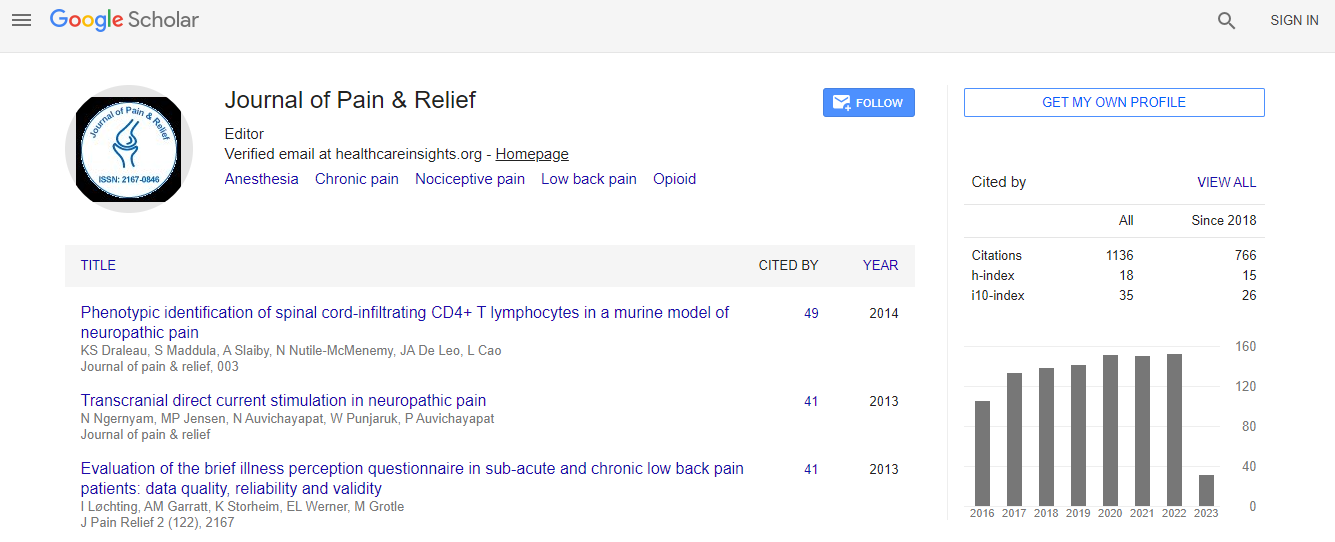Research Article
Evaluation of a Methadone Protocol for Severe Chronic Pain Management in Thai Patients: A Prospective Study
| Phutsadee Pudchakan1, Krittika Tanyasaensook1, Pongparadee Chaudakshetrin2, Penkae Ketumarn2 and Chuthamanee Suthisisang3* | |
| 1Department of pharmacy, Siriraj Hospital, Mahidol University, Bangkok, Thailand | |
| 2Department of Anesthesiology, Siriraj Hospital, Mahidol University, Bangkok, Thailand | |
| 3Department of Pharmacology, Mahidol University, Bangkok, Thailand | |
| *Corresponding Author : | Chuthamanee Suthisisang Department of Pharmacology, Faculty of Pharmacy Mahidol University, Bangkok 10700, Thailand Tel: 662-644-8677 Fax: 662-354-4315 E-mail: chuthamanee.sut@mahidol.ac.th |
| Received: February 08, 2016 Accepted: April 15, 2016 Published: April 18, 2016 | |
| Citation: Pudchakan P, Tanyasaensook K, Chaudakshetrin P, Ketumarn P, Suthisisang C (2016) Evaluation of a Methadone Protocol for Severe Chronic Pain Management in Thai Patients: A Prospective Study. J Pain Relief 5:243. doi:10.4172/2167-0846.1000243 | |
| Copyright: © 2016 Pudchakan P, et al. This is an open-access article distributed under the terms of the Creative Commons Attribution License, which permits unrestricted use, distribution, and reproduction in any medium, provided the original author and source are credited. | |
Abstract
Background: Methadone is a synthetic opioid that is clinically effective in chronic pain management. However, the use of methadone is very limited in Thailand because physicians are not familiar with its dosing and are concerned about risks relating to drug accumulation and cardiac arrhythmias. Objective: The purpose of this study was to develop and implement a methadone protocol for patients with severe chronic pain in order to assure efficacy and safety of methadone. Methods: The protocol was developed based on published clinical studies and guidelines. The validated protocol was implemented in 34 patients at the Pain Clinic, Siriraj Hospital, Bangkok, Thailand. During the study period, pain score, pain interference score, neuropathic pain score, severity of adverse effects, and QTc intervals were investigated over a 3 month period. Results: The results obtained from 21 patients that completed the study showed a significant reduction in median pain intensity (p < 0.001) and other chronic pain interferences based on BPI-T (p < 0.001), excepted for the emotional score (p < 0.004) using methadone doses ranging from 2-30 mg daily. Neuropathic pain was also significantly reduced (p < 0.001). Common adverse effects were drowsiness (55.88%), constipation (35.29%), and nausea and/or vomiting (11.76%). Regarding ECG monitoring, seven patients without QTc prolongation at baseline developed QTc prolongation after methadone initiation. However, QTc interval greater than 500 msec or presentation of Torsades de Pointes were not found. No significant change in the mean QTc interval was observed after initiating methadone (p=0.951). Conclusion: Administration of methadone according to the protocol described in this study was found to be effective and safe for severe chronic pain management. ECG monitoring and drug interaction screening in patient treatment plan is advised when prescribing methadone.

 Spanish
Spanish  Chinese
Chinese  Russian
Russian  German
German  French
French  Japanese
Japanese  Portuguese
Portuguese  Hindi
Hindi 
